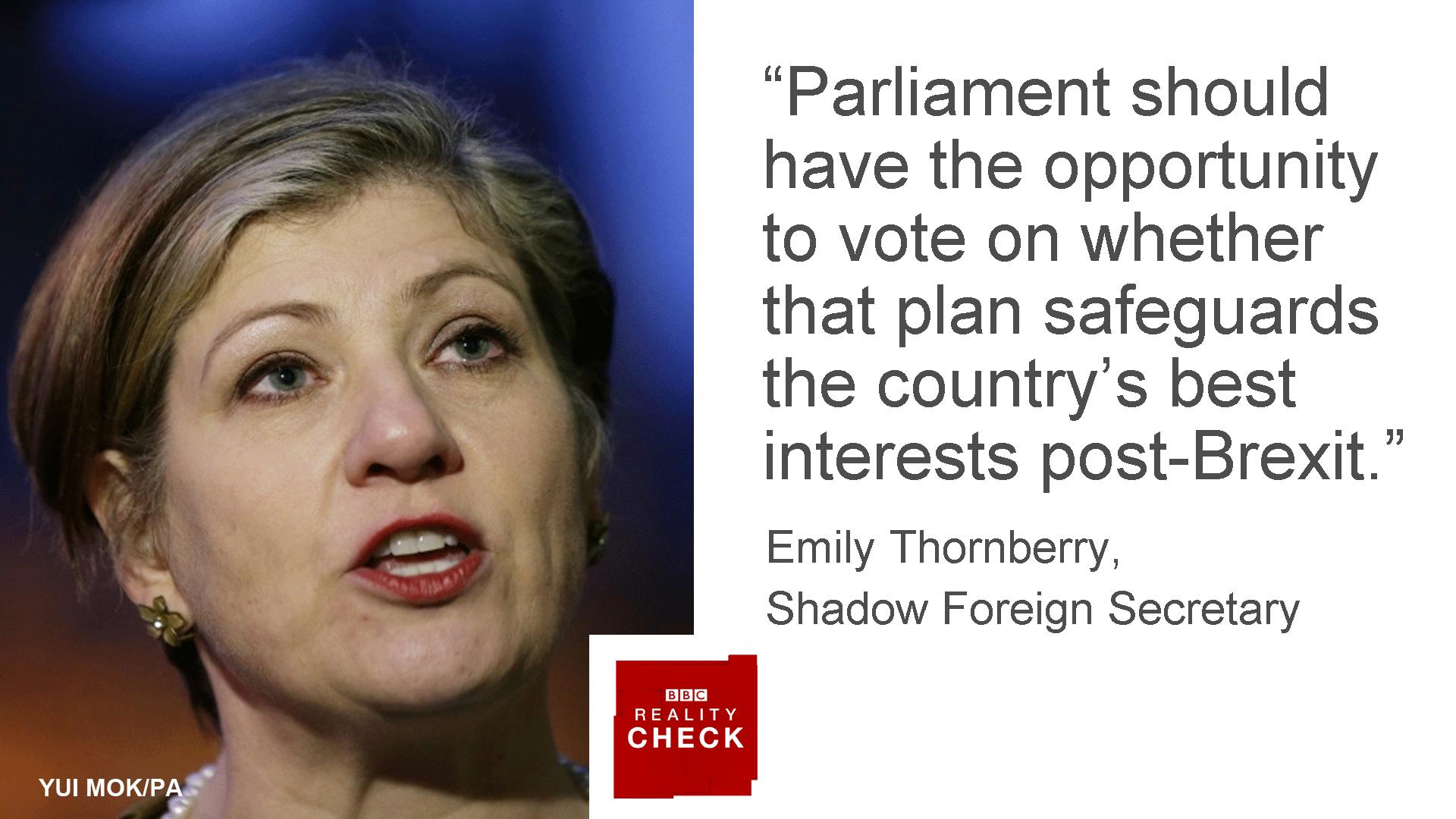Reality Check: Will Parliament get a vote on Brexit deal?
- Published

The claim: Parliament should get to vote on the government's plans for how the UK leaves the European Union.
Reality Check verdict: There will certainly be votes in Parliament about Brexit - possibly lots of them - but that doesn't mean that MPs have the power to stop the UK leaving the EU, nor to dictate the terms of Brexit.
Not all votes in Parliament have the same status. There can be votes on motions that call on the government to do something which have no legal force. Then there are votes which can block legislation or block treaties.
So when might Parliament get to vote on the nature of Brexit - and what impact could those votes have?
Opposition Day - 12 October
There could in principle be a vote on Labour's opposition day motion:
"That this House recognises that Brexit is the defining issue facing the UK; believes there should be a full and transparent debate on the Government's plan for Brexit and calls on the Prime Minister to ensure this House is able to properly scrutinise government plans for Brexit before Article 50 is invoked".
However the Government has accepted that proposal with the following amendment:
"...and believes that the process should be undertaken in such a way that respects the decision of the people of the UK when they voted to leave the EU on 23 June and does not undermine the negotiating position of the Government as negotiations are entered into which will take place after Article 50 has been triggered."
Labour has accepted the amendment so it looks unlikely that a vote will be needed.
Debate before Article 50 is invoked
The Government's acceptance of the (amended) Labour motion seems to commit it to a further debate before Article 50 is triggered, which the prime minister has said will happen before the end of March.
Labour describes this as a significant concession, but it remains unclear whether there will actually be a vote and the Government isn't committed to allowing MPs to determine its negotiating strategy. Nor would the debate give MPs an opportunity to block the triggering of Article 50.
Legal challenge to invoking Article 50
The Government claims it can invoke Article 50 using the Royal prerogative but that is subject to a legal challenge which starts later this week. If the challenge succeeds the Government would have to pass an Act of Parliament to trigger it by introducing a Bill.
That would certainly give MPs and peers several chances to vote. Bills have to go through several 'readings' in each House and there could also be attempts to amend it. And it would also mean that Parliament had real power in determining the process for Brexit. But we'll have to wait to see the outcome of the legal process.
Repeal Bill
The Government plans to introduce a Great Repeal Bill to convert existing EU laws and regulations into UK law. Again, that also means more chances to vote and it also gives MPs and peers an opportunity to throw a spanner into the works.
If the Bill were defeated then leaving the EU would be much messier. There would be a massive amount of legal uncertainty in many areas of life.
But it's not the same as MPs getting to decide the terms of Brexit or to block it, and it's widely assumed that the Bill will pass.
Vote to ratify the Brexit agreement
A House of Lords Library note, external argues that "parliament would have a statutory role in ratifying an eventual agreement".
If that's right it could give the House of Commons (but not the House of Lords) the power to block whatever deal is negotiated.
However, that still doesn't mean MPs could block Brexit - and nor could they insist on an alternative deal. Under the terms of the Lisbon Treaty the UK would cease to be a member of the EU after two years anyway.
And it's not entirely clear that the Brexit deal negotiated under Article 50 will have the status of a formal treaty at all, so the issue may not arise.
Future treaties with the EU
It's important to realise that the future relationship that the UK has with the EU will not solely be determined by the Brexit negotiations that take place under the terms of Article 50. In fact, many of the important questions, e.g. about future trade rules, are likely only to be agreed in a separate treaty.
Parliament has a statutory role in ratifying treaties so, again, MPs and peers would potentially get to vote - and they could block proposed new trade agreements. But this could all happen after the UK had already left the EU. It's not the same as blocking Brexit.